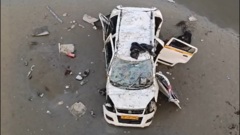In a shocking incident that claimed three lives, a car veered off an unfinished bridge in Uttar Pradesh, India, leading to serious questions about the accountability of navigation apps like Google Maps. The men were reportedly en route to a wedding when their vehicle fell onto a riverbed after veering off the bridge, which had partially collapsed due to earlier flooding.
Initial police investigations suggest that Google Maps guided the individuals to traverse the hazardous route, although local residents were aware of the danger and had avoided it. This raises significant concerns about the app’s reliability, particularly as there were no warnings, barricades, or signage to indicate that the bridge was unsafe for crossing.
As a result of this tragic event, authorities have lodged a police complaint against four engineers from the road department and an unnamed official from Google Maps, accusing them of culpable homicide. A representative from Google has stated that the company is cooperating with the ongoing investigation.
This incident has sparked widespread discourse regarding India's deficient road infrastructure and the extent to which navigation applications should be held liable for accidents. While some individuals criticize Google Maps for failing to provide accurate information, others point to a broader systemic failure by government officials to secure and monitor dangerous locations effectively.
With approximately 60 million active users in India, Google Maps remains the most popular navigation tool in the country, powering services across various sectors, including ride-sharing and food delivery. Despite its widespread use, the app has faced criticism in the past for misguiding users, leading to several deadly accidents.
Notably, similar issues have occurred previously, such as a man drowning in a dam in Maharashtra state in 2021 after he allegedly followed the navigation directions. Legal experts are divided on whether Google Maps can be held liable in court; while the Indian IT Act offers protections to digital intermediaries, there may be grounds for negligence if it can be demonstrated that the app ignored timely updates regarding road hazards.
As calls for improved road safety and infrastructure governance intensify, it is evident that reliable navigation tools must be complemented by proactive measures from authorities to ensure users are informed and safe on their journeys.




















